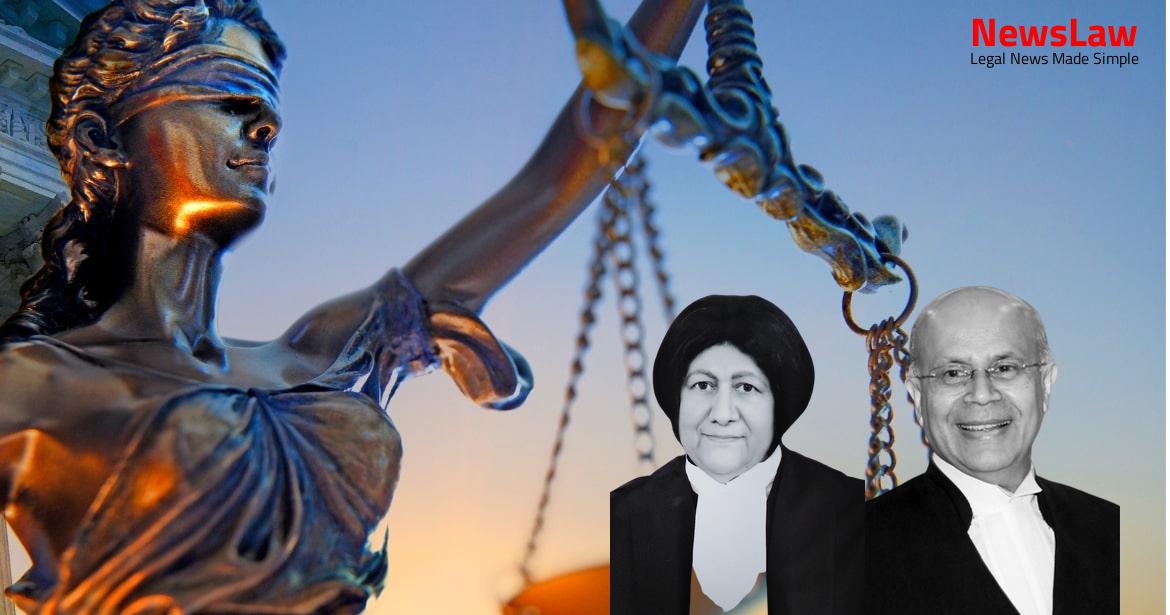Vide the aforesaid judgment, the Division Bench of the High Court had set aside the order dated 03.03.1993, passed by the appellant-Bank, wherein the Dated 30.07.2009. A fresh notice was served upon him on 06.07.1991, to which the respondent no.1 again sought time and the documents for filing his reply. On 03.03.1993, the Disciplinary Authority dismissed the respondent no.1 from the service under Regulations 7(3) read with Regulation 4- D of the 1976 Regulations. Vikramjit Banerjee, learned Additional Solicitor General of India appearing for the appellant-Bank, submitted that the impugned judgment of the High Court has been passed on a wrong premise, without properly appreciating the arguments. The draft of the said amendment, as approved by the Board of Directors in its meeting held on 31.08.1985, was forwarded to the Government of India, Ministry of Finance and to the Reserve Bank of India for its formal sanction. Referring to the Regulation 20(3)(b) of the 1979 Regulations, the learned counsel for the appellant-bank argued that this clearly provides that the disciplinary proceedings against an employee shall be deemed to be pending on the date of retirement in case a show cause notice has been issued to him before that. Punjab National Bank (2007) 8 SCALE 240, wherein this Court opined that, the Regulation should be given full effect even with reference to the legal fiction provided therein.
Rabindranath Choubey, (2020) 18 SCC 71, a three-Judge Bench of this Court had expressed its reservation with reference to the view expressed in Rajender Lal Capoor -I ( supra ) delivered by a Two-Judge Bench of this Court. Aman Hingorani, learned counsel appearing for the respondent no.1, submitted that the facts of the case in Rajender Lal Capoor -I ( supra ) were totally different, as in that case chargesheet had been issued to the employee while he was in service. It was further submitted by learned counsel for the respondent no.1 that even if the amendment to Regulation 20 of the 1979 Regulations as proposed by the Bank had been approved by the Reserve Bank of India and thereafter by the Government of India and adopted by the appellant-Bank on 17.04.1986, however, any amendment in the Regulations would take effect only after its publication in the Official Gazette in terms of the amendment made in Section 19(1) of the 1970 Act. Admittedly, there was no publication in the Official Gazette and for the first time, the appellant- bank had issued a circular to all the branches on 28.05.1986, regarding the amendment carried out in Regulation 20 of the 1979 The Banking Companies (Acquisition and Transfer of Undertakings) Act, 1970. Before we proceed to consider the arguments raised by the learned counsel for the parties, we deem it appropriate to refer to the legal position with reference to the arguments raised regarding Regulation 20 of the 1979 Regulations. A fresh notice was served upon him on 06.07.1991, to which the respondent no.1 again sought time and the documents for final reply. The order of suspension was challenged by the respondent no.1 by filing a Writ Petition before the High Court, which was disposed of on 10.01.1992, with certain directions regarding the inquiry, while not interfering with the order of suspension. The intra-court appeal against the aforesaid appeal was dismissed by the High Court. While interpreting the 1979 Regulations, this Court opined that the legal fiction created in clause (iii) of Sub-Regulation 20(3) of the 1979 Regulations, must be given full effect, but it is well- settled that the scope and ambit of the legal fiction should be confined to the object and purport for which the same has been created. In the aforesaid case, even though the employee was not in appeal before this Court against the order of his compulsory retirement but still this Court invoking the principles, as contained in Order XLI Rule 33 CPC, granted relief to the respondent. The disciplinary proceeding, thus, is initiated only in terms of the 1976 Regulations and not in terms of the 1979 Regulations. While putting the tools for interpretation and giving a harmonious construction to the provisions of the 1976 and the 1979 Regulations, this Court opined that if the intention of the Regulation making authority had been that the legal fiction as created in Clause (ii) of Sub-Regulation (3) of Regulation 20 of the 1979 Regulations would cover both clauses (i) and (iii), the same should have been placed only after clause (iii). On an exhaustive consideration of the manner in which the provisions have been analysed and the clear and unambiguous language of the same and also having regard to the provisions of the 1976 Regulations of the Bank with regard to initiation of disciplinary proceeding we have no doubt in our mind that the meaning given to the provisions of the Regulations in the said case is correct and does not require any reconsideration. Meaning thereby that on the date of his superannuation, no disciplinary proceeding was pending against him. The observation made in para 38 of the Mahanadi Coalfields Limited (supra), as relied upon by the learned counsel for the appellant-Bank, will also not come to its rescue for the reason that the observation was made while referring to the judgment of this Court in Rajender Lal Capoor -I ( supra ) and not the Rajender Lal Capoor -II ( supra ) and also in Canara Bank’s case (supra) where on a reference to a Larger Bench the law laid down in Rajender Lal Capoor’s (II) case ( supra ) was reiterated. The judgment of this Court in Punjab National Bank’s case (supra), as relied upon by the learned counsel for the appellant- Bank, is also distinguishable on facts as in that case the chargesheet was issued to the employee concerned before his retirement. The appeal is accordingly dismissed……………………J (HIMA KOHLI)…………………..J (RAJESH BINDAL) New Delhi October 12, 2023.



